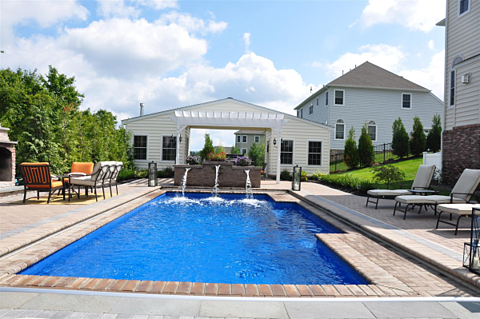5 Benefits of Fiberglass Swimming Pools
When I first decided to install fiberglass swimming pools for a living, I knew the benefits fiberglass pools offered, but I really didn’t “know” them. I didn’t really realize how dramatic those benefits were. You see, it’s easy to know that using less energy to heat a pool is a good thing. But to fully understand the impact that this has on pool ownership is another ball of wax altogether.
After meeting with hundreds of people and discussing their pool projects I began to realize something, anytime I would name a benefit of fiberglass pools to a customer, they would react like I had reacted when I was first learning about fiberglass pools. They heard the benefits, but they didn’t really understand the impact of those benefits.
Quite honestly, most people are under-amazed. It’s not because they don’t care, it’s because in the limited amount of time I have with a client during a meeting, which usually only lasts an hour or two, I simply do not have enough time to devote to educating clients where they go from hearing a list of benefits to fully understanding how these benefits will impact their life as a pool owner.
However, in this article I will list the benefits, and attempt to clarify what it means to a potential pool owner. Sound good? Let’s do this.
What are the 5 key benefits of fiberglass swimming pools, that straight-up destroy the competition?
Fiberglass Pools Use Less Chemicals
Fiberglass Pools Use Less Energy to Heat
Fiberglass Pools Are Easier to Maintain
Fiberglass Pools Install faster
Fiberglass Pools Have a Lifetime Warranty
Fiberglass Pools Use Less Chemicals
I know, Yawn right. No, this is exciting stuff. Do you really want to swim in a giant vat of chemicals? Heck no! No one wants themselves, or their children, to have to do that.
If the price of chemicals alone does not make you want to use less of them, the thought of swimming in them should. As a matter of fact, we currently recommend that all of our new pool buyers skip this whole chemical ordeal and go straight to a salt water based system. And since fiberglass swimming pools are the only type of pool 100% compatible with salt, why not?
Fiberglass Pools Use Less Energy to Heat
This is a huge deal, not to be taken lightly. I promise you, this very well may be the single most important benefit of a fiberglass pool from a cost of ownership standpoint. Every year we speak with people that have a vinyl or a gunite pool already and are considering switching to fiberglass simply because the cost of heating their current pool is higher than the cost of removing their pool and installing a fiberglass pool. For many more people, they simply have pools that are colder than they want to swim in, and simply do not swim often because of it.
Let me explain: using a simple calculation, we can determine the cost of heating a fiberglass pool vs heating a vinyl or concrete pool. Because vinyl pools are basically just a thin liner with zero insulating property on top of the soil, and concrete is just hard soil, these two types of pools have the same heating properties. Whereas fiberglass was first designed as an insulator, and therefore has much better heat retention properties.
The pictures below show a backyard that originally had a vinyl liner pool and switched over to a fiberglass pool.
On the original pool, the homeowner had a 450,000 BTU heater and it would take 3 full days or 72 hours to heat.
On the new fiberglass pool, we installed a 150,000 BTU heater and it only took 8 hours to heat.
Right there, doing some simple math, we can determine that since the old heater was 3 times the size and took 9 times as long to heat, the fiberglass pool uses 1/27th the energy to heat. If we factor in that the original pool did hold 50% more water that figure drops to 1/18th the energy to heat for that volume of water.
What does this mean in dollars and cents?
Since 1 gallon of propane contains roughly 91,500 BTU’s, running a 450,000 BTU heater consumes 4.92 Gallons of propane per hour.
In the real world it took 3 days (72 hours) to heat that old vinyl pool from 65 degrees to 83 degrees (the homeowner’s preferred swimming temperature). This resulted in 4.92 Gallons of propane being used every hour for 72 hours or a total of 354 gallons of propane used.
After switching the pool to fiberglass and doing the same experiment every year after, for 7 years now, we have had consistent results.
It takes us 8 hours using a 150,000 BTU heater resulting in 1.64 gallons of use per hour or a total of 13 gallons to perform the same heating process.
As of 3/11/2016 NYSERDA lists the average price of propane in NY as $2.34 per gallon for the month of February 2016. This means that the fiberglass pool would cost $30.42 to heat vs $828.36 for the vinyl pool. Not to mention that it took 3 days running the pump 24/7 to heat the vinyl pool. If we adjust for the pool’s size difference ,a vinyl or concrete pool of the same size would cost $547.56 and take two days to heat.
So, what does this all mean in the real world? It means that since it costs so much and takes so long, a vinyl or concrete pool is seldom heated. Yes, people have a heater, but who wants to spend that kind of money heating one of these pools? On the other hand, fiberglass pools are very easy to heat, and once the sun heats it up a bit, all it takes is an hour or two to get the temp just perfect on a cool evening costing less than 10 dollars.
What would you rather have, a pool that is comfortable to swim in, or a cold pool?
Fiberglass Pools Are Easier to Maintain
Vinyl and concrete pools both require lots of maintenance. I could stop there, but then you would not understand the true ramifications of this.
You see, these pools require more maintenance and more TLC than fiberglass. Things that would destroy a liner or a concrete pool are just no problem for fiberglass. Get the chemicals wrong on a vinyl or liner pool and you could be looking at a serious repair bill.
While a mistake in chemical dosage could cause a liner to fade or a concrete shell to disintegrate, a fiberglass shell can take a beating like that and not even notice. In fact, fiberglass containers are used in the chemical and oil industries as storage vessels. Here is a picture of the Leisure Pools factory when it was still in Texas. The giant fiberglass tanks, although marketed under a different brand name, are made in the same building using the same materials.
Fiberglass pools never need resurfacing like their concrete counterparts and never need new liners like Vinyl pools. These maintenance items not only cause lots of down-time, they can be very expensive. The pool liner to the left was just one year old when a tree branch fell into the pool over the winter. A repair like this costs between $6000 to $8000, depending on the size of the pool and amount of damage done to the structure beneath the liner.
Here we have a gunite pool that is about to be resurfaced. This process takes place every 10 years or so and can easily run $25,000 to $30,000 and even more depending on the amount of structural damage and size of the pool.
As you can see, pool maintenance like this is not for the faint of heart.
Fiberglass Pools Install faster
O.K. This one is as simple as it sounds. We can install a fiberglass swimming pool in as little as one day. No other type of swimming pool can say this. Most Vinyl liner pool dealers take upwards of one month and Gunite pool builders can easily take 3 months. But I figured this would be easier to show you than talk about so check out our video of a fiberglass swimming pool being installed in one day.
Fiberglass Pools Have a Lifetime Warranty
The fiberglass pools we sell do anyway.A lifetime warranty offers you peace of mind that the pool you chose for your family will be there year after year, creating family memories to last a lifetime. The reason manufacturers of fiberglass pools can offer a lifetime warranty is that they are confident in their choice of materials used in your new fiberglass swimming pool. Every material that Leisure Pools uses in the construction of your pool gets tested in their own in-house laboratory, known as the Leisure Pools Technical Center, verifying its composition and quality.
If it does not meet the strict guidelines that Leisure has in place, it’s simply sent back. The Leisure Pools Technical Center is run by Dr. David Rogers, a polymer chemist with a PhD in resin chemistry. You can rest assured that if you choose a Leisure Pool for your backyard that Dr. Rodgers and his staff have verified that all the components of your pool meet Leisure Pool’s strict guidelines for quality control.
Thank you for taking the time to read this article. Hopefully you have learned a little more about fiberglass pools and their unique benefits in the process. Feel free to check out some of out some of our other interesting reads, such as our pool pricing page and our pool financing page.
About the Author
Our company started with a simple idea: Treat people the way we’d like to be treated. Provide choices, be up-front with pricing, and give them quality features in their landscape. More than 15 years and hundreds of satisfied customers later, we continue to make good on this commitment. Pool technology has changed tremendously, opening up the possibilities for what type of pool you can have and the stonework surrounds—and all the elements that can go along with it. This has made installing great poolscapes even more enjoyable for our crew.




